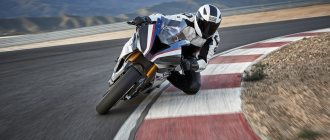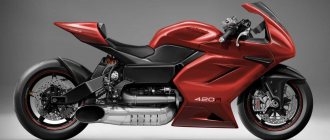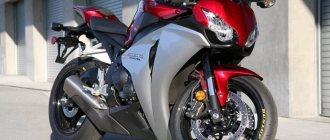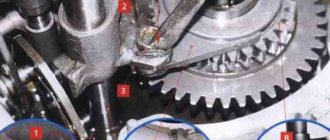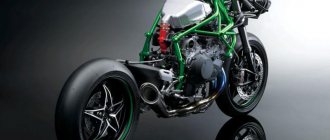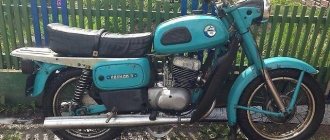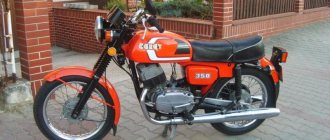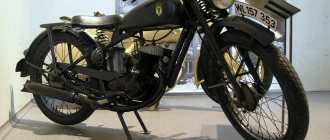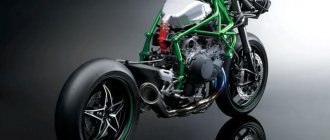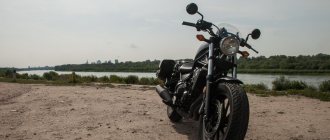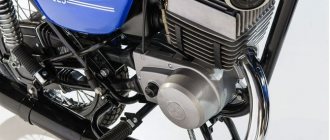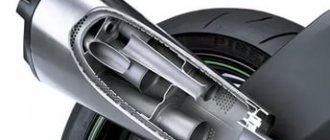BMW HP4 Race 2019
“This... this was literally one of the most exciting moments of my motorcycle life,” I said, taking off my helmet. My hands were still shaking from a healthy dose of adrenaline.
I just finished my second track session at New Jersey Motorsports Park on the BMW HP4 Race, and to say it was unlike any other bike I've owned would be an understatement. Dylan Code, Keith's son and lead project manager for California Superbike School, helped me put the bike on a stand.
“Well, is it better now?” Dylan asked me with a hint of a smile. After my first run, I said that I felt extremely self-conscious, and Dylan agreed with me. He then showed me how to raise the seat to give me some more room and I immediately felt the difference.
“Go take a break, drink some water, and let's see what you can do in the final race,” he said, putting warmers on the tires to keep the racing slicks in perfect condition. I happily obliged, grabbed a bottle of water and sat in the shade, hoping to take a break from the summer heat.
Getting to know the BMW HP4 Race
BMW HP4 Race
Let's go back in time for a moment to find out how I ended up on one of the most (if not the most) exclusive BMW motorcycles
It all started with a call from Dylan. BMW was generous and gave the California Superbike School a copy of the HP4 Race so that potential buyers could try riding it. And although I don’t look like a “potential buyer” for this $78,000 thing, Dylan thought it would be a sin to ignore such a unique opportunity, even if he had no intention of buying it.
A unique opportunity is putting it mildly.
For those who are not familiar with the abbreviation HP from BMW, I will explain: HP stands for High Performance, that is, high power. By their own definition:
This is a division of BMW Motorrad, creating components and motorcycles of the highest segment.
The previous generation of HP consisted of the HP2 Enduro, HP2 Sport and HP2 Megamoto, and with the new generation, the HP4, which includes the HP4 Race, BMW has gone further than ever in creating a truly unique experience for the owner of this motorcycle.
Limited to just 750 units, the BMW HP4 Race was built from the ground up to be completely different from the rest of the BMW range. At first glance it looks like a heavily modified S1000RR, but the truth is that beyond the styling elements, the two bikes have very little in common.
While the previous HP4, as well as the S1000RR, were homologated for public roads, the HP4 Race is a track-only machine. The engineers were given a blank sheet of paper and tasked with creating the best track bike possible, no matter the cost. They didn't have to worry about compliance with environmental regulations, and they didn't have to fit into any existing racing framework, since the HP4 Race is not homologated for any racing class.
In many ways, this bike is even better than the S1000RR that rode in World Superbike,” Dylan told me as we discussed the details. ... -To participate, you take a stock bike, strip it, trim it, put the rest together and get a new device. But in the case of HP4 Race, they immediately did what they wanted. BMW calls this a “production prototype.”
BMW HP4 Race is better than the S1000RR raced in World Superbike
We disassemble HP4 Race
It is based on the engine for World Superbike . Pistons and connecting rods are weight-matched and mounted on a balanced crankshaft. All 16 valves (4 per cylinder) are made of titanium. The engines undergo a series of dynamic break-in tests and a full endoscopic examination to confirm completeness and serviceability before installation in the chassis. The engines are assembled by one person, thereby ensuring precision assembly.
The result of this approach is 215 horses from the wheel at 13,900 rpm and 119 Nm at 10,000 rpm. But thanks to the bike weighing 40kg lighter than the stock S1000RR, BMW claims that in an equivalent ratio (i.e. when comparing acceleration characteristics) it produces around 227 horsepower.
The bike has a curb weight of 171 kg, and the new Ninja 400, which is almost 5 times less powerful, weighs almost the same. Dylan said the HP4 Race is just over 2kg heavier than a MotoGP bike.
Carbon and titanium play an important role in the HP4 Race's weight reduction. It has a full carbon frame, skin and wheels. The frame is almost 5 kg lighter than the stock S1000RR frame, and the total weight of the wheels is one and a half kilograms less, thereby reducing rotational inertia and the gyroscopic effect in corners. The exhaust is a full titanium Akrapovic for World Superbike. Even the engine hardware is made of titanium.
Aside from the seat I mentioned earlier, almost every aspect of the bike is customizable to your ergonomic preferences. The seat (more precisely, the carbon subframe) can be set to 81.5, 83 and 84.5 cm in height. The highest option suited me, in which my knees took the right place between the footrests and the seat. The footpegs have 8 different positions, but I didn't adjust them.
In addition to the ability to customize the bike's ergonomics, the rider also has access to full steering geometry customization. Complete spacers allow you to adjust the axis of rotation of the pendulum, the offset of the steering wheel and the angle of the steering column. The rear shock absorber arm can be adjusted between 108 and 118 mm. There is even a set of stars that allows you to change the acceleration and top speed from 299 to 329 km/h.
WSBK GP4-PR Brembo with titanium pistons
The bike's braking system consists of two four-piston WSBK GP4-PR Brembo monoblocks with titanium pistons mounted on discs with T-shaped suspension. At the rear there is another WSBK four-piston fixed caliper with titanium pistons. The braking force of this entire set is such that there is nothing to even compare it with.
And the same goes for the suspension. The front suspension of the HP4 Race consists of an Öhlins FGR 300 WSBK fork with spring preload, compression and rebound adjustments. The fork stays rotate with the fender, so there is no need to unscrew the brake calipers when changing wheels. The front suspension also includes an Öhlins SD052 adjustable steering damper
As mentioned earlier, the Öhlins TTX36 GP rear shock is mounted to the aluminum swingarm via a variable rate progression. Thanks to this, the rider can change the nature of the suspension depending on the riding conditions. The shock absorber itself has a full set of settings.
The electronic components of the BMW HP4 Race were developed by 2D. Almost every aspect of the bike's electronics can be customized by updating the ECU firmware. In stock form, the bike has four riding modes: Wet (wet), INT (intermediate), Dry 1, and Dry 2 (dry 1 and 2)
The modes affect the nature of the response to the throttle, the operation of traction control and wheelie control, and depend on the selected gear. Riders also have the ability to increase or decrease the amount of traction control intervention and engine braking by up to 7 clicks each way from the standard setting for the selected riding mode.
Dylan also explained to me how to use the Quick Start mode. He made it clear that for this mode to work correctly, the gas must be fully opened. The first ride on the $78,000 machine was intimidating in itself, not to mention leaving the pit stops at full throttle. I decided that I would do without testing this feature on the first run.
Carbon skeleton.
The main feature of the BMW HP4 RACE is its monocoque frame, made of ultra-strong and lightweight carbon fiber using RTM (Resin Transfer Molding) technology. The same technology is used to produce bodies for the BMW i3 electric car and the BMW i8 hybrid sports car. Blanks made of dry carbon fiber are placed between two parts of special molds, after which the future part is sealed, and liquid resin is fed into the mold under pressure. The binding component displaces all the air, after which it polymerizes under the influence of temperature and turns into a durable composite. To create a beautiful glossy coating on the surfaces of the finished part and protect the composite material from moisture and ultraviolet radiation, another gel-like polymer is applied to the surface of the matrix - gelcoat. RTM technology also allows various fasteners and bearings to be embedded before molding, eliminating the need to drill holes in the finished part and thus increasing its strength.
The result is a seamless frame that is not only stiffer than the three-piece welded aluminum skeleton of the standard S1000RR, but also 4kg lighter. The wheels are naturally also made of carbon. They are 30% lighter than conventional forged ones and can withstand colossal shock loads, although the latter fact is not as relevant for a racing motorcycle as for a road motorcycle (especially taking into account Russian realities). The fairing elements are also carbon, and the “tail” and foam seat are mounted on a carbon subframe.
As a result, the motorcycle's dry weight is just 146 kg, and when fully fueled and ready for combat, it weighs only 171 kg. Simply put, it is lighter than the 400 cc sportbikes of the early 90s. The only negative is that due to the carbon frame and wheels (such modifications are prohibited in most championships), this racing motorcycle can only be used in a few tournaments, for example, the Macau Grand Prix or IRRC.
Gleb Koltsov: “An interesting nuance, carbon conducts heat very poorly. More precisely, it perfectly insulates the rider from the heat created by the 215-horsepower four-cylinder stove, and increases comfort during races on the track.”
Is there anything metal in this superbike? Of course, its liter four-cylinder engine is hand-built to international endurance racing specifications. It has “only” 215 hp. and 120 Nm of thrust, that is, 16 hp. and 7 Nm more than the standard S1000RR. However, if you think that this motor was simply freed from the environmental “collar” and reflashed, you are mistaken. It has new, stronger, hot isostatic pressed liners, and all-new milled connecting rods from the renowned Austrian company Pankl, connecting the standard S1000RR pistons to a 200-gram lighter and balanced crankshaft.
The head, naturally, has more aggressive camshafts, allowing for increased lift of the intake and exhaust valves; at the intake, there is a new manifold with optimized channels and servos, which, like on the stock S1000RR, allow the length of the channels to be shortened after 11,500 rpm, for maximum power . Naturally, this is not a complete list of the “chips” of this engine, but the most interesting thing is that according to the head of the BMW HP4 RACE project, Josef Makler, each such engine actually produces more than 215 horsepower from the wheel! That is, there should be about 230 forces on the flywheel, and this is not the level of endurance racing, but the level of a world superbike!
Gleb Koltsov: “I used to think that racing motorcycles at the WSBK level was very difficult. I thought they were tough and capricious. In fact, it turned out that with each lap I was getting more and more pleasure from the controls! I filmed second by second from the circle and did it playfully. The HP4 RACE is much easier to ride than the standard S1000RR, and the difference is simply colossal. And it’s not only about the most modern electronics, which help with acceleration, braking, and cornering, but also the overall balance of characteristics, the light and tractable chassis and the excellent responsiveness of the engine. The lightness, power and surgical precision of this motorcycle envelops you with its charm. When I switched from the HP4 RACE back to the S1000RR, the latter began to seem like a real bus to me!”
Now each HP4 RACE engine, prepared according to the 6.2 BMW Motorsport specification, can travel in combat modes for at least 5000 km (i.e. a season in the FIM EWC), and if there is a “vegetable” behind the wheel, at least 2 times more. After this, according to the regulations, the engine must be sent back to its homeland for rebuilding, which costs 12,500 euros.
Three races on HP4 Race
The starting procedure for this bike is quite different from anything I have ever encountered before. You need to start the engine, let it warm up and then turn off the ignition. It takes about 10 minutes for the oil to reach the correct temperature. At this point, the motorcycle must be restarted and wait until the antifreeze temperature returns to the operating value. To reduce weight, the bike does not have a cooling fan.
My first race was five laps at the Thunderbolt track at New Jersey Motorsports Park. Luckily, Dylan was kind enough to give me a few tries to ride the bike, because the first time I was so self-absorbed, I didn't remember much of the pre-instruction Dylan gave us in class that morning.
I found myself driving cautiously on the first lap because I had completely forgotten that the tires had been warmed up with heaters beforehand. I kept pressing the clutch through shifts, even though the HP4 Race has an electronic quickshifter. On top of everything else, the annoying thought was spinning in my head that I was riding a motorcycle that cost a third of my house. In general, there was enough to think about during the first race.
The worst part was that it was very uncomfortable for me to sit. I could hardly move, and my knees were locked in one position. I felt like a fighter fighting a motorcycle. When I shared my disappointment with Dylan, he adjusted the seat height and sent me on a second run.
I immediately felt much more comfortable and relaxed.
In the first run I set the ride mode to Intermediate, but in the second I switched to Dry 1. The throttle was noticeably stronger in the first three gears, and the response was much smoother than I expected.
The BMW HP4 Race sounds like a maddened hellhound unleashed from its cage, but it carries itself with the finesse of a Queen Mother at a tea ceremony.
Once I relaxed, I felt even more comfortable riding it. The power comes on smoothly and predictably, building quickly with enormous thrust until the revs hit the redline at 14,500. With a seat height of 84.5 cm, I felt comfortable moving around in it and the handling immediately improved and the pace began to pick up. On straight sections, the front wheel rose in the first phase of the wheelie, and then gently dropped back to the track when the electronics were triggered. The steering was more than precise. I got excited and recklessly drove into a right turn without braking, immediately after which I need to put the bike down and make a sharp turn to the left. This transition can throw off many riders, myself included, but the HP4 Race stayed on track like a glove. I passed the apex and quickly opened the gas. The bike didn't move.
I was literally laughing in my helmet when I pulled into the pit stop at the end of the second moto. Dark clouds on the horizon threatened to end my “track day”, the HP4 Race was parked on the stand and I decided to grab a quick bite to eat. While I ate my sandwich, Dylan told me about his impressions of the bike.
Next generation electronics.
Naturally, the creators of the HP4 RACE simply did not face the issue of the cost of components, so the BMW superbike received a set of racing electronics that even NASA employees would envy. The regular S1000RR has the most modern ABS, which allows you to fly into corners in trail breaking, and smart traction control tied to the IMU, and anti-wheelie. But the HP4 RACE's electronics are on a completely different level. Firstly, almost each of the systems can be configured not only by the degree of intervention (DSC and EBR have 15 of them each), but also depending on the selected gear. And this is not surprising, because the ultra-light Bavarian superbike is capable of tearing the front wheel off the asphalt when accelerating up to 5th gear!
Any rider will be able to find the right balance of adjustments for themselves. An inexperienced pilot will set the values to maximum and will feel completely safe, while a professional will be able to reduce the traction intervention in order to exit corners more aggressively - in a slide. The HP4 RACE also has such useful features as the Launch Control function, a speed limiter in the pit lane and a 2D data logger connected to a GPS transmitter and allowing you to save all readings during a race on the track. If you're not a tech geek, you might have to make friends with a WSBK or MotoGP race engineer to make sense of all this information, but for those with a more professional approach, a datalogger will be an invaluable assistant.
Gleb Koltsov: “The traction control is radically different from what is on the standard S1000RR. On the HP4 Race, when the traction control intervenes, you will not notice anything except the popping of the exhaust system due to misfires, it works so delicately and subtly, literally as if it is connected with you at the subconscious level.”
Dylan Code on HP4 Race
My first trip wasn’t much different from yours,” Dylan admitted. -When I sat on it, I was terribly afraid to go fast. It's a very unusual bike and not many people have ridden it before me, so I felt like a complete newbie.
After the first race I was like, aha, cool, I’ll go again. Most straights in the last 10 percent of revolutions lose a little traction, as if they are slowing down, and if you turn the engine up to the theoretical 100% of revolutions, it slows down even more. But here's what I realized about the HP4 Race: it just does what you ask of it, without resisting, delivering 100% traction at 100% throttle opening.
The thing is that this bike does not have any characteristic features. There are bikes that are just as light, just as powerful, with the same brakes. You can find elements of the HP4 Race in a lot of other bikes, but BMW has put them all together and that's what makes it so incredible.
If you don't like something about it, chances are it can be replaced. If you don’t like the nature of the response, you can change it so that it feels like a two-stroke, like a two-stroke, like anything else, because its ECU is absolutely not blocked in any way. You can change so many different parts and aspects of this bike that in some ways it's the only track bike you need if you can afford it.
I've had several cadets purchase the HP4 Race and they are all absolutely delighted. We are talking about grown men who have been riding motorcycles for decades, and they are overjoyed. This is my main conclusion about him
I'm on the track 100 days a year. The tracks I go to are all over the world. I wouldn’t say that I’m fed up, but I’ve traveled quite a lot and it’s hard to surprise me with anything. And then this bike arrives and suddenly I rediscover the track. It's very cool, it's like you've gone back in time and straight to your second track day.
World Superbike level components.
Of course, any motorcycle of this level is outstanding not due to one or two specific details, but only due to the totality of all components and settings. It would be stupid to compromise and use some half measures when building such a motorcycle - an “exhibition of brand achievements”, so BMW engineers went through the catalogs of top manufacturers of suspensions, brakes and all other peripheral elements and ordered the very best.
Thus, the handling of this superbike is ensured by an Öhlins FGR 300 inverted front telescopic fork and a TTX 36 GP monoshock absorber from the same Swedish brand. Such components can be found on most factory superbikes and prototypes competing in the WSBK and MotoGP championships. Light-alloy swingarms for the HP4 RACE are supplied by the company of the Swiss motorcycle racer and designer Eskil Suter; the same ones are used on the racing versions of the S1000RR.
Gleb Koltsov: “The habits of this motorcycle are similar to those of the S1000RR, only the HP4 RACE makes everything 10 times easier and faster. The speed of cornering is much higher, getting to the apex is much easier. The first impressions I got from the front end of the bike and the fork in particular are that it is very informative. I literally felt every stone. At the same time, we rode on hard Pirelli Diablo Superbike SC2 - tires that have never been famous for feedback.”
Thanks to the 215-horsepower engine and close-ratio transmission (according to Gleb, the key differences from the stock transmission appear in 4th gear), this carbon motorcycle accelerates to the very last gear faster than the cannonball that Baron Munchausen flew on. Naturally, all this unbridled kinetic energy needs to be absorbed somehow. The guys at BMW could have installed a brake chute, for example, but instead they opted for lightweight and insanely efficient Brembo GP4-PR (Production Racer) four-piston monobloc calipers, whose titanium pistons force Brembo Z04 pads into thick T-shaped 320mm Brembo brake discs . The GTZ with a cylinder diameter of 19 mm is borrowed from Moto2 racing bikes. Guess the manufacturer.
Gleb Koltsov: “I saw philistine reviews that they could have installed carbon brakes. But such braking systems are not only prohibitively expensive, but they also need to be able to be used correctly and constantly be kept in a high temperature range. Please note that even on MotoGP motorcycles, during rainy races, carbon brakes are replaced with classic steel ones.”
My last run.
Dylan is at the track a hundred days a year, and I'm at the track about five. So, after having a snack, I quickly suited up and headed back to the bike. I wanted to grab one more race before it started to rain.
Knowing that even Dylan was nervous on the first run, I felt more confident since this was my third run. I knew that I would probably never ride this bike again, so I just relaxed and had fun. If in the first race I fought with him, then in the third we danced.
I didn't worry about the timer or breaking my own records, I just tried to lose myself in every emotion it gave me. Putting all the performance charts out of my mind, I focused on how nice it was to drive and how lucky I was to have this opportunity. I was no longer evaluating the HP4 Race for readers, but rather just a guy on an expensive bike trying to prolong a fleeting moment.
And now the checkered flag ended my run at the BMW HP4 Race.
Specifications
Technical characteristics of BMW HP4:
| Model | BMW HP4 |
| Motorcycle type | sports |
| Year of issue | 2012-2014 |
| Frame | aluminum, engine - load-bearing element |
| engine's type | 4-cylinder 4-stroke in-line |
| Working volume | 999 cc |
| Bore x Stroke | 80x49.7 mm |
| Compression ratio | 13.0:1 |
| Cooling | liquid |
| Number of valves | 4 titanium valves per cylinder, DOHC |
| Fuel supply system | injector BMS-KP |
| Ignition type | electronic |
| Maximum power | 193 hp at 13000 rpm |
| Maximum torque | 112 nm at 9750 rpm |
| Transmission | 6-speed |
| type of drive | chain |
| Front tire size | 120/70 ZR 17 |
| Rear tire size | 200/55 ZR 17 |
| Front brakes | 2 discs, 320 mm, 4-piston radial calipers, Race ABS |
| Rear brakes | 1 disc, 220 mm, 1-piston caliper, Race ABS |
| Front suspension | 46 mm inverted fork (all adjustments, DDC), travel - 120 mm |
| Rear suspension | pendulum with monoshock absorber (all adjustments, DDC), stroke - 130 mm |
| Overall dimensions (LxWxH) | 2056x826x1138 mm |
| Seat height | 820 mm |
| Wheelbase | 1422 mm |
| Gas tank capacity | 17.5 l (including reserve - 4 l) |
| Maximum speed | 299 km/h |
| Acceleration to 100 km/h (0-100) | 3.2 sec |
| Motorcycle weight (curb) | 199 kg |
Conclusion
Stepping into the HP4 Race is like strapping yourself into the space shuttle. A shuttle with razor-sharp steering and brakes that stop the thing like Chuck Norris' pinwheel stops a villain. I could write all sorts of things here, but I still won’t be able to convey the feeling of riding it.
Although I felt more confident after three rides, I still couldn't overcome the little voice in my head that kept telling me I'd have to sell my house to pay if I crashed this bike.
As he helped me place it on the stand, Dylan assured me that while he'd really fallen in love with the HP4 Race, it wouldn't be enough for him to really enjoy it.
If you have two of them,” he explained, “you will not worship him.” Because when there are two of them, you're just like: hey, yeah, I have two of them, let's go for a ride.
However, I consider myself extremely lucky to even just ride one of these, without even thinking about buying one... or two. The truth is that most of you will never get to ride it around... But if you are one of the lucky ones who gets the chance to lift your leg over its seat, I recommend that you don't refuse. Even if you have to give it back later.
